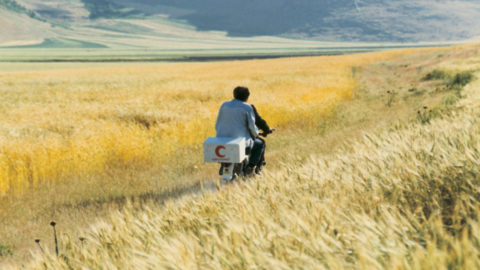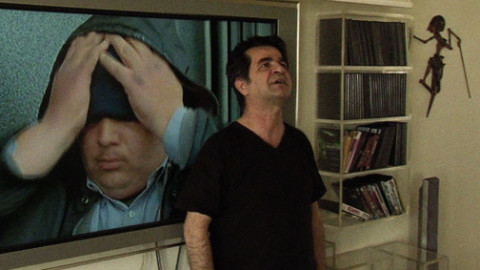Film of the Week: Taxi
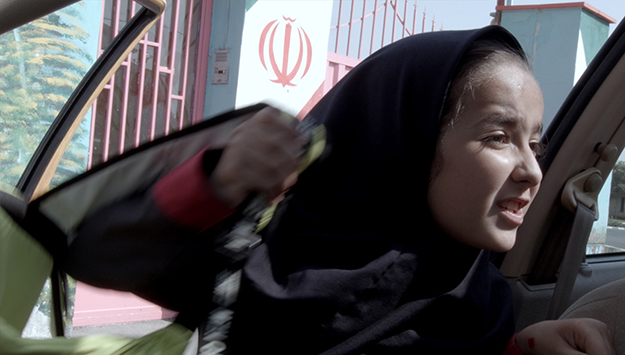
Before he fell foul of the Iranian government in 2010, Jafar Panahi was very much a realist filmmaker, his aesthetic seemingly a world away from the self-referential concerns which mark much of the work of Abbas Kiarostami and Mohsen Makhmalbaf. Then the social critique of films such as The Circle (00) and Offside (06) led to Panahi being threatened with imprisonment, prevented from traveling, and forbidden to make films for 20 years. He has responded by working surreptitiously—and becoming a very different kind of director. If a filmmaker is barred from working yet continues to work nonetheless, much of his concern may justifiably focus on the moot question of whether or not he’s “actually” making films, as the authorities understand it. This Is Not a Film (directed with Mojtaba Mirtahmasb, 11), shot while Panahi was under house arrest in his Tehran apartment, is a tantalizing hybrid of documentary self-portrait and contemplative fiction, at once an act of rebellion and a singular example of film as legal loophole: Panahi was effectively telling his persecutors, “You never specified that I couldn’t make a film like this, because you never could have anticipated me making it.”
This Is Not a Film crackled with both anger and nervous energy, mixing Panahi’s expression of his restlessness with a vibrant sense of new possibility. I was less convinced by the follow-up, Closed Curtain (directed with Kambuzia Partovi, 13), a somber, absurdist parable that induced precisely the feeling of depressive claustrophobia that its predecessor had so triumphantly dispelled. Shot, self-evidently, in Panahi’s house by the sea, the film also displayed an irksome dimension of narcissism—as though Panahi couldn’t keep himself, and the posters for his movies, out of the film, so as to (unnecessarily) to remind the world that the story was really about him. Now Panahi again appears in Taxi, his third letter from internal exile, and the winner of this year’s Golden Bear in Berlin. After Closed Curtain, Taxi shows Panahi loosening up again and enjoying the pleasures of his city.
The film, set and filmed entirely in a taxi driving through Tehran, using small well-concealed cameras, starts with a shot looking out through the windscreen. After a while, the cab stops to pick up passengers; a man gets in and we hear his voice; eventually the camera pans round to reveal him and a woman sitting behind him (this is one of those shared taxi services that are standard in many cities). The man—a cocky, short-sleeved young guy—is complaining about tire thieves, whom he would like to see hanged. The woman calmly objects. There have recently been hangings in Tehran, she points out: “Did anyone learn anything?” she asks rhetorically. The man’s having none of it: “Law and sharia have spoken, so chill out, lady” (the subtitles are in breezy Western demotic). To which she retorts—and the audacity of this line is quite breathtaking in a film made in an Islamic country at this particular moment—“So sharia will solve all our problems by increasing the number of executions? After China, we have the most executions in the world.” The man sneers on hearing that she is a teacher: “You work in fiction, lady.” Then this stickler for law and order dismounts and reveals his own profession: he’s a mugger.
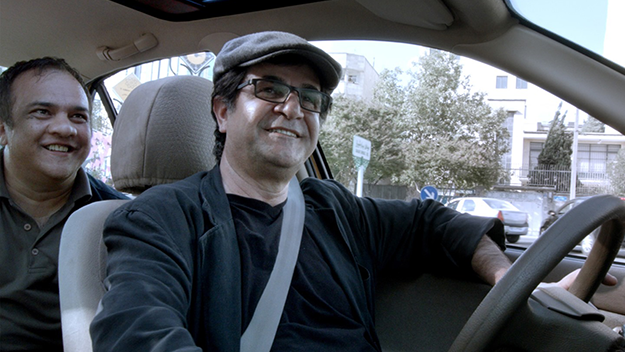
It’s now, about nine minutes in, that the camera pans round once more to reveal none other than Jafar Panahi in the driving seat. We quickly realize that we’re looking not at a taxi driver in a drama played by Jafar Panahi, but at Panahi himself, the well-known film director, driving a cab or possibly masquerading as a taxi driver. On one level, we’re aware that, in reality, he’s doing this in order to make a film; but on another, we can’t help wondering whether perhaps Panahi is driving for a living now that he’s banned from directing (it was, apparently, this very worry that inspired him to make the film).
Panahi is soon recognized, although the film keeps it ambivalent whether he’s recognized for real by an actual passenger, or recognized in a fiction by someone playing a passenger. It doesn’t really matter which—the cast’s energetic naturalness makes it hard to tell who is real and who is an actor, though Iranian viewers may well pick up on nuances of performance that give the game away. Panahi’s next customer, at any rate, identifies him and asks whether his previous passengers were actors in a film that he’s shooting; he also points out that part of their dialogue came right out of a scene in Panahi’s own Crimson Gold (03). This new passenger knows his movies. Squat, sweaty, and bumptious, he is Omid the DVD bootlegger, who once supplied Panahi with Once Upon a Time in Anatolia and Midnight in Paris. His wide catalogue currently includes Kim Ki-duk and Kurosawa, as well as The Walking Dead (season five), but he can also offer Panahi dailies of films currently being shot (presumably Iranian ones, in which case this seems a slightly tactless offer to make to a filmmaker who’s barred from touching a camera). Omid boasts that he is the only way that people in Tehran get to see foreign movies—“Without me, no Woody Allen”—but it seems likely that he’s also the only conduit to certain Iranian movies too, like the one we’re watching.
All human life, it seems, is on the streets of Tehran, and in Panahi’s cab. A couple get in: the man is bloodied after a bike accident. Thinking he’s about to die, he borrows a cellphone to record his will on camera. Two elderly ladies get in with a bowl containing a fish which, apparently as a matter of life and death, must be placed in a certain pond by midday. One of Omid’s clients is a young filmmaker who asks Panahi to help him find a subject. Panahi replies: “Those films are already made, those books are already written. You have to look elsewhere, you have to find it for yourself.” This may well be an in-joke at Panahi’s own expense, since Taxi itself has arguably already been made in Iran, in the form of Kiarostami’s pioneering 2002 in-car drama Ten.
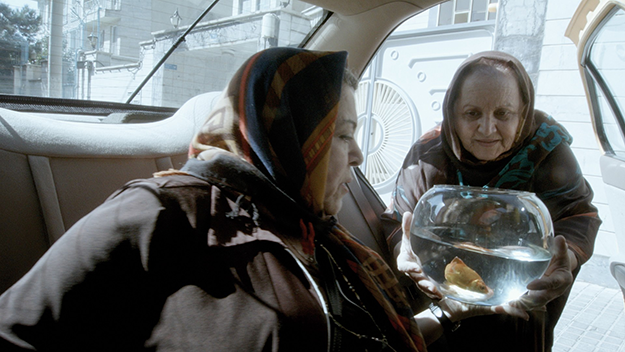
Panahi shows us a world in which people are constantly filming, even while his own camera—in fact, three Blackmagic Cinema Cameras—remains unseen, and we never quite get a handle on who is moving it. A friend of Panahi, who has been beaten up, shows him footage of the attack on his iPad. While the meta-cinematic can often come across as a neurotic tic in Western films, here the act of filming the everyday is shown as hugely important, for it captures indispensable evidence of hidden truths in a society where image-making is subject to state suppression.
This meta-cinematic aspect comes to a head when Panahi collects his young niece Hana from school. She berates him for turning up in a taxi: she told her friends her director uncle was picking her up, and how will she look now? Hana threatens to get out and find her own way home, “like the girl in your Mirror film”—a reference to Panahi’s 1997 feature. Again, a certain narcissism is at work here, as people are constantly referring to Panahi’s filmography; it would have been a lot funnier if, instead, he had dropped his movie titles into the conversation and no one had known what he was referring to.
Hana too is a budding director, whose teacher is encouraging her to make a “distributable” film. But that entails certain rules, she explains: a distributable film requires respect for the Islamic headscarf, no contact between men and women, ties to be worn by bad guys only, and an avoidance of “sordid realism.” At one point, as she films a wedding couple—who are meanwhile being filmed by their official videographer—her camera catches a street boy collecting junk, who pockets a banknote that the groom has dropped. From her seat in the back of the cab, this lofty young cineaste calls the boy over to berate him: by committing a criminal act on camera, he has made her film undistributable. Hana wants him to return the cash: “I only want to show sacrifice and selflessness,” she says. To which the boy replies—as well he might, given his economic status—“What the fuck is sacrifice and selflessness?”
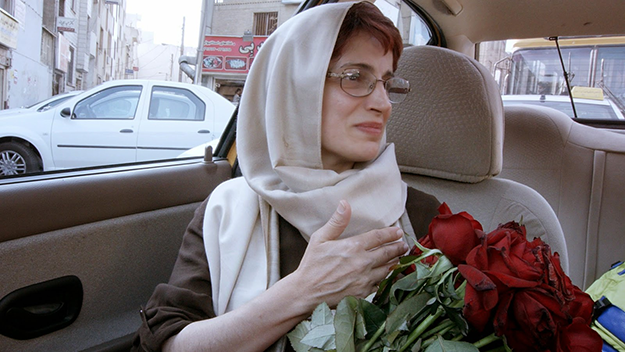
Panahi’s final passenger is a bespectacled woman carrying a bunch of roses. Although never identified in the film, she is the real-life human-rights lawyer and activist—and recipient, along with Panahi, of the Sakharov Prize—Nasrin Sotoudeh. She’s on her way to visit Ghoncheh Ghavami, a woman imprisoned after attending a volleyball match alone, and now protesting through hunger strike—a desperate last resort, says Sotoudeh, but one that she and Panahi have both themselves used. Breaking the fourth wall, Sotoudeh offers a rose to the camera—and to the watching world—“because the people of cinema can be relied on.” Then she warns Panahi: “Better remove my words from your movie. You’ll be accused of sordid realism!”
“What is sordid realism?” Hana finally asks, noting that her teacher advised her to “show what’s real, but not real real . . . If reality is dark and unpleasant, don’t show it.” Until its final frames, in which the real real creeps into shot while Panahi’s back is turned, Taxi seems not to show anything obviously dark and unpleasant—but Panahi is working in a social context that is entirely dark and unpleasant for filmmakers like him, and for women like Ghavami and Sotoudeh (herself jailed for almost three years for defending dissidents).
Taxi may feel slight and loose, but it exudes joy and wit, its vivacity making the film a much more eloquent act of protest than the solemn, introverted Closed Curtain. Panahi, intermittently glimpsed smiling behind glasses and flat cap, seems to be having a great time in enjoyable company—and it’s only a shame that we don’t know who most of his collaborators are. Taxi’s final words are its bitterest joke. A caption informs us that Iran’s Ministry of Islamic Guidance approves the credits of distributable films; Panahi adds the note, “Despite my heartfelt wish, this film has no credits.” The punch line of this blackest of real life comedies is that, of course, it’s the undistributable films that the world most needs to see.



